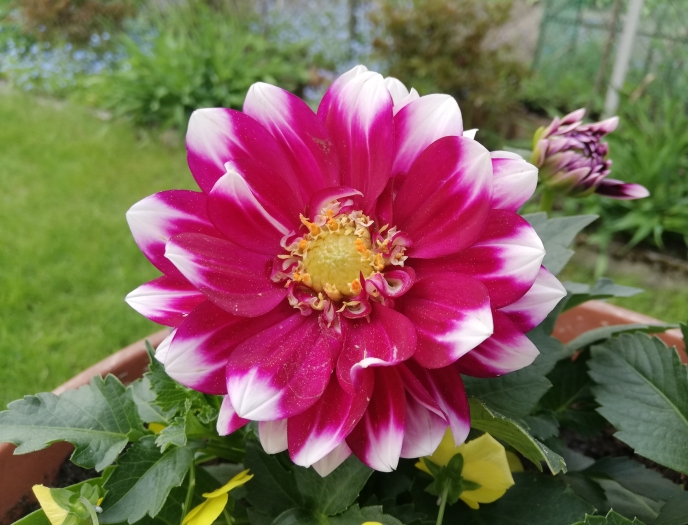Garden Dahlia
(Dahlia ×pinnata)
Garden Dahlia (Dahlia ×pinnata)
/
/

Eatcha
CC BY-SA 4.0
Image By:
Eatcha
Recorded By:
Copyright:
CC BY-SA 4.0
Copyright Notice:
Photo by: Eatcha | License Type: CC BY-SA 4.0 | License URL: https://creativecommons.org/licenses/by-sa/4.0 | Uploader: Eatcha | Publisher: Wikimedia Commons | Title: Dahlia_pinnata_-_Hexagon_at_central_Delhi.jpg | Notes: |




















































Estimated Native Range
Summary
Dahlia ×pinnata, commonly known as Garden Dahlia, is a deciduous perennial herb that is a hybrid of garden origin, believed to have been created in the late 1800s through the crossbreeding of Dahlia pinnata, Dahlia coccinea, and Dahlia sorensenii. It typically grows to a height of 2-4 feet and a width of 1-3 feet. The Garden Dahlia is renowned for its vibrant and showy flowers, which come in a wide array of colors including yellow, orange, pink, purple, white, red, and blue. These blooms appear in the summer and fall, adding a splash of color to gardens during these seasons.
Garden Dahlias are highly valued for their stunning flowers and are often used in border plantings, urban gardens, and as cut flowers due to their long vase life. They require rich soil with a pH level of around 6.5-7.5, enriched with organic matter. The shallow roots of dahlias necessitate consistent moisture, so it is important to water them regularly to prevent the soil from drying out. To protect the tubers from freezing temperatures, they should be lifted and stored in a frost-free location during winter. Dahlias can be propagated from seeds, but more commonly, they are cultivated through division of tuberous roots or stem cuttings. Full sun exposure and well-drained soil are ideal for their growth. While they are generally easy to maintain, dahlias can be susceptible to pests such as slugs and diseases like powdery mildew. It is also important to stake taller varieties to support their growth. Gardeners should be cautious of its potential invasiveness outside its native range and check local guidelines before planting.CC BY-SA 4.0
Garden Dahlias are highly valued for their stunning flowers and are often used in border plantings, urban gardens, and as cut flowers due to their long vase life. They require rich soil with a pH level of around 6.5-7.5, enriched with organic matter. The shallow roots of dahlias necessitate consistent moisture, so it is important to water them regularly to prevent the soil from drying out. To protect the tubers from freezing temperatures, they should be lifted and stored in a frost-free location during winter. Dahlias can be propagated from seeds, but more commonly, they are cultivated through division of tuberous roots or stem cuttings. Full sun exposure and well-drained soil are ideal for their growth. While they are generally easy to maintain, dahlias can be susceptible to pests such as slugs and diseases like powdery mildew. It is also important to stake taller varieties to support their growth. Gardeners should be cautious of its potential invasiveness outside its native range and check local guidelines before planting.CC BY-SA 4.0
Plant Description
- Plant Type: Herb
- Height: 2-4 feet
- Width: 1-3 feet
- Growth Rate: Moderate
- Flower Color: Cream, Orange, Pink, Purple, White, Yellow
- Flowering Season: Summer, Fall
- Leaf Retention: Deciduous
Growth Requirements
- Sun: Full Sun
- Water: Medium
- Drainage: Fast, Medium, Slow
Common Uses
Bee Garden, Bird Garden, Butterfly Garden, Deer Resistant, Hummingbird Garden, Rabbit Resistant, Showy Flowers
Natural Habitat
Hybrid of garden origin with no specific native habitat
Other Names
Common Names: Dahlia , Pinnate Dahlia , Dahlie , Georgine , Dalia , Georgina , Dalria , 다알리아
Scientific Names: Dahlia ×pinnata , Dahlia variabilis , Dahlia hybrida , Dahlia purpurea , Dahlia rosea , Dahlia barkeriae , Dahlia superflua , Georgina purpurea , Georgia variabilis , Georgina rosea
GBIF Accepted Name: Dahlia ×pinnata Cav.